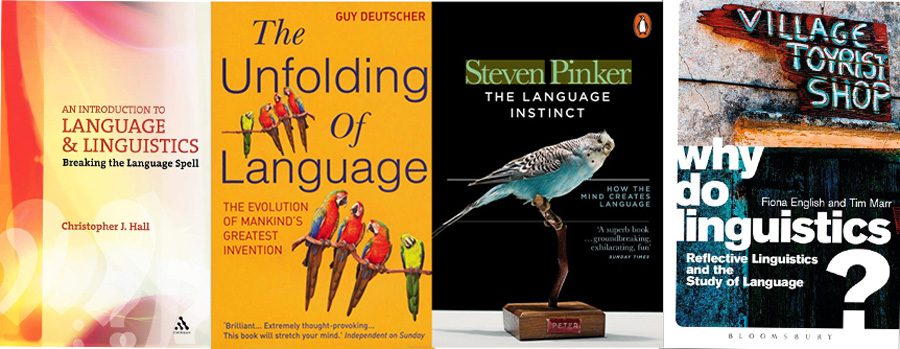1. Learn a new language
Whilst this might be an unexpected suggestion to prepare for an English Language degree, by learning a new language not only will you be able to communicate with a broader community. Learning a new language will enable you to see how different languages express concepts and sounds that are not present in your mother tongue. Did you know that Spanish has one single word (estrenar) that means ‘to buy and use for the first time’? Did you know that some African languages have sounds (e.g., clicks) that are not present in languages anywhere else in the world? There are around 7000 languages with English representing just a tiny fraction of the linguistic diversity of the world. Learning a new language will help you become more reflective about languages and their structure and get a better understanding of the human capacity of language. There are some free apps like Duolingo that can give you a good start.
 2. Read a book about language
2. Read a book about language
Language is a topic that has been talked about for centuries. It has prompted some challenging questions and has encouraged many scholars to find the answers. Why don’t humans speak the same language? Can animals understand when we speak? Can we teach language to primates? Does birdsong follow linguistic structure? Can we design robots with the capacity to learn language like babies do? These and many more questions have been explored by many academics who have written their reflections in books that are easily accessible to everyone.

3. Form an opinion about current debates about language
Language is our primordial communicative tool and part of our identity is strongly attached to the language we speak. There are multiple linguistic identities and whether you are a linguist or not, everyone has an opinion about language and the identities they represent. As such, language is often at the centre of heated debates with people often taking opposing views. For example, should we use singular ‘they’ to masculine or feminine connotations (he/she)? It is important to engage in the debate and form evidence-based opinions about language. There are many podcasts and blogs that discuss linguistic issues and that can guide your attention to important aspects of language that probably you hadn’t reflected on.
4.) Learn about the sign languages of deaf communities
One of the most important discoveries of the language sciences is that language is not limited to speech. Sign languages are the languages of the deaf communities which communicate grammatical structures with the body. Contrary to folk knowledge, sign languages are not universal, they do not have the same grammar as spoken languages, and they emerged naturally like all spoken languages.
The differences between speech and sign raise challenging questions for the field of linguistics. Do children learn sign languages in the same way as speech? Do different brain regions process sign languages or is it the same as speech? Are people with good visual memory better at learning sign languages?
The linguistics of sign languages is fascinating so it is highly recommended to explore this world by exploring the vocabulary and narratives in British Sign Language or read about deaf culture and their language. When we widen our linguistic lens to the area of sign languages, we can get a better understanding of language and what it can do. A great book on this is:
Final year English Language student Kathryn recommends:
 English Language and Linguistics covers a lot more than you think and I think the application is one of the most interesting parts of ELAL. Start noticing and observing patterns in real life scenarios where language is used. Language board and family games like charades, taboo, banangrams or the ever-reliable scrabble are not only silly and fun to play, but also good in helping you think about gesture, connotations, lexis and vocabulary, morphological syllables and structures of particular words. For example, for the word 'teachers' you gain more points than the root of the word, 'teach' in scrabble, and you only have to add the '-er' morpheme and plural '-s' suffix to make it appear more complex.
English Language and Linguistics covers a lot more than you think and I think the application is one of the most interesting parts of ELAL. Start noticing and observing patterns in real life scenarios where language is used. Language board and family games like charades, taboo, banangrams or the ever-reliable scrabble are not only silly and fun to play, but also good in helping you think about gesture, connotations, lexis and vocabulary, morphological syllables and structures of particular words. For example, for the word 'teachers' you gain more points than the root of the word, 'teach' in scrabble, and you only have to add the '-er' morpheme and plural '-s' suffix to make it appear more complex.
If you apply a similar analytical eye to a TV show, such as Catchphrase, you might start noticing parallel structures or rhyme in the sayings or proverb answers. Or even watch a few clips of films revolved around ELAL, like The King's Speech, which focuses on speech impairments and would be really useful for those of you who are interested in exploring the speech and language therapy pathway offered through an ELAL degree. I've even seen example assignments and dissertations on such material! I understand it might be daunting to start preparing for what may seem like a long time away, but it's always good to be ready and explore what's freely available and around you. Simple start noticing and observing language in use!
The King's Speech Trailer